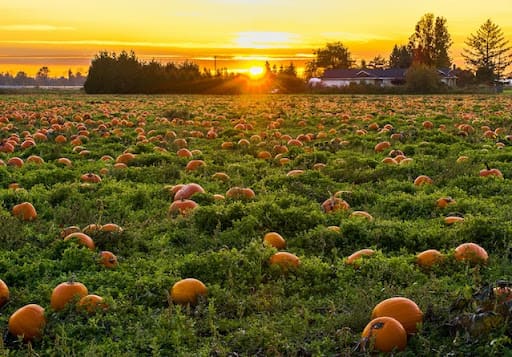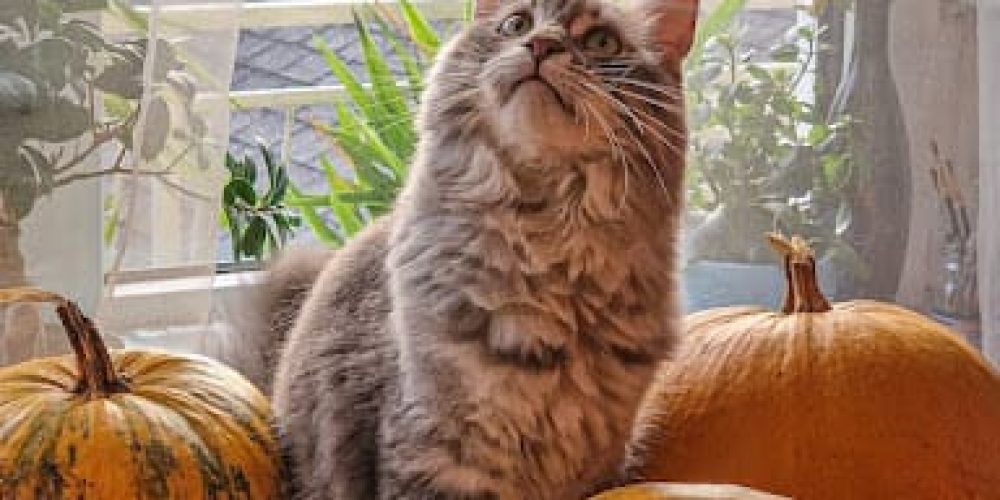4 pumpkin facts for pet parents this Halloween
Are pumpkins safe for pets?
Well, the gourd news is – pumpkin flesh and seeds are not just safe…
They’re actually spookily good for pets!
Pumpkins originally come from Mexico, and we’ve been eating them for over 9000 years. Pumpkins are actually a type of fruit. They’re berries belonging to the squash family, just like courgettes, cucumbers and melons.
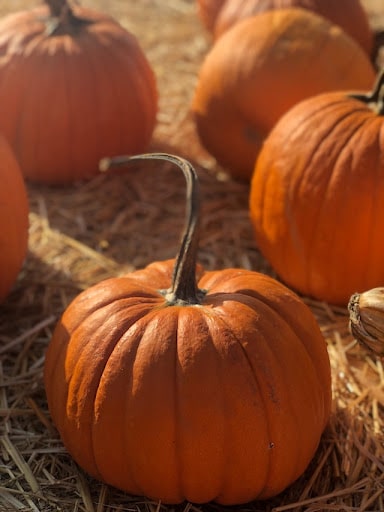
Pumpkins have 4 layers:
- The stalk that attaches it to the plant it grew on
- The hard skin or rind
- The orange flesh or pulp
- The seeds and stringy fibrous strands surrounding them
Everything inside your Halloween pumpkin is safe for pets to eat. This includes the orange flesh and seeds.
A word of caution though!
Pumpkins and pumpkin seeds are not poisonous to cats or dogs, but pumpkins are not risk-free for your fur baby.
- Hard pumpkin rind can’t be digested. It may be fun to chew, but if it’s swallowed, it’s a choking hazard or risks blocking your fur baby’s intestine.
- Raw pumpkin flesh and seeds can also be choking hazards for puppies, cats and very small dogs.
Should I let my cat or dog eat pumpkin?
Pumpkins are not only edible but paw-sitively packed with healthy nutrients, vitamins and minerals
Pumpkin pulp
Roasted or boiled, pureed or fresh, pumpkin is a tasty treat for pets. But it’s also packed with all sorts of healthy minerals and vitamins to keep your fur baby in paw-somely good health. Because pumpkin flesh is rich in:
Fibre:
- including soluble and highly digestible fibre
- great for digestion!
Vitamins:
- Vitamin A helps eyesight, bone growth and the body’s defence system
- Vitamin C a natural anti-oxidant, meaning it helps protect the body’s cells from damage
- Folate helps in making blood cells, nerve development and heart and gut function.
Minerals:
- Potassium supports healthy nerve and muscle function. Cats and dogs with kidney disease may struggle to keep enough potassium in their bodies, so pumpkin is a definite plus here!
- Iron, Phosphorus and magnesium: are all important for blood, muscles, bones and nerves
Pumpkin seeds
Are equally pumped with goodness, including:
- Fatty Acids: oleic acid and alpha-linolenic acid. Great for healthy skin, coat, growth and immune systems.
- Vitamin E helps prevent cell damage and promotes healthy skin, bone, nerve and muscle
- Vitamin K plays an important role in clotting blood and coagulation. Pets with liver disease often lack Vitamin K
- Minerals: Zinc, Manganese, Phosphorus, Potassium, Iron and Copper
All of these vitamins and minerals are important to animals. But where supplements are concerned, it’s important to know that your pet can have too much of a good thing. Extreme diets (like raw liver) and unnecessary supplements, can cause serious illness to otherwise well pets.
A healthy balanced diet will supply your fur baby with all the nutrition they need to be the happy (most of the time) and energetic (some of the time) rascals we love (all of the time!). And pumpkin is a healthy and natural source of gourd-ness galore!
What are pumpkin’s superpowers?
Pumpkins, a natural health remedy for dogs and cats!
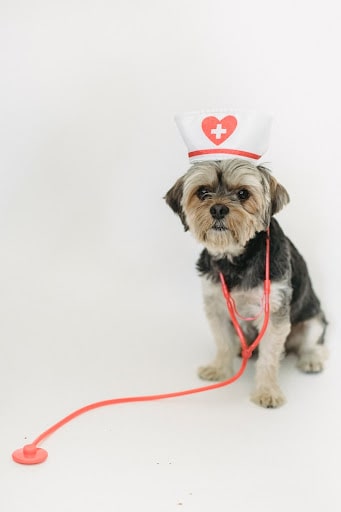
Treating diarrhoea
Pumpkin contains lots of special soluble and digestible fibre, which helps to settle diarrhoea.
- Soluble fibre absorbs water, bulking out your pet’s poo, making it firmer and more regular
- Some fibre breaks down to produce fatty acids, which feed cells with energy to help the bowel recover more quickly
Pumpkin is a prebiotic
- A prebiotic stimulates growth of healthy bacteria and a healthier gut by reducing acidity and providing bacteria with essential nutrients.
Treating constipation
- On the other end of the spectrum, the fibre and water content of pumpkin also help to regulate stool consistency and relieve constipation
Weight loss and regulation
- High fibre and water content keep your fur baby feeling fuller for longer.
Emptying anal sacs
Does your fur baby suffer from full anal glands? And that means all the scooting, licking and antisocial odours that go along with the problem!
Feeding pumpkin can help keep things moving by bulking out poo and squeezing the glands empty naturally!

OK, ghoulishly gross, but you get the picture, right?
Killing worms
One thing’s for sure, whatever disguises land on your doorstep this Halloween, they won’t be as scary as this unwelcome visitor!
Meet your not-so-friendly neighbourhood tapeworm.
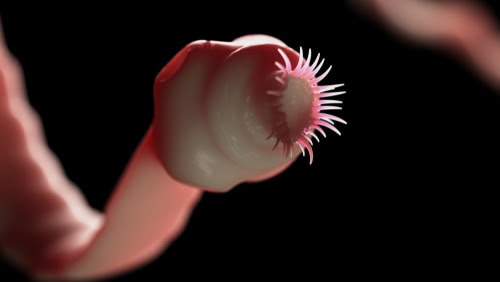
Pumpkin contains high amounts of a compound called cucurbitacin. And cucurbitacin is poisonous to many common dog parasites.
But whilst parasite-killing pumpkin is an added bonus, the only way to keep your fur baby safe from the wiggling nasties is with their regular worming treatment.
So all-in-all your humble pumpkin turns out to be one serious superhero superfood.
And as medications go, it definitely passes the taste test with most fastidious felines and particular pooches.
How much pumpkin and pumpkin seed should I feed my dog or cat?
Pumpkin pulp
- Cut the pumpkin flesh into chunks and bake at 180 degrees Celsius (350 Fahrenheit, gas mark 4) until soft
- Add suitably sized chunks for some tasty variety in your fur baby’s regular dinner
- Alternatively, puree, refrigerate or freeze for future use
As a treat
- Even healthy treats should be at most 10% of your fur baby’s daily ration.
- The remaining 90% should come from a balanced and nutritious complete diet
Pumpkin seeds
Although pumpkin seeds contain lots of nutrients, eating too many can cause upsets.
As a guide
- Small dogs can safely consume three to five seeds in a day
- Medium dogs five to 10 seeds a day
- Large dogs 10 to 20 seeds in a day.
Pumpkin seeds are a choking risk to small dogs and cats. The safest thing to do with pumpkin seeds is to roast them and grind them up. Then you can sprinkle them over food as a tasty supplement.
- Rinse seeds thoroughly
- Allow to dry
- Roast in the oven at 180 degrees for an hour
- Grind the seeds to make a fine supplement for your pooch or pusscat’s regular diet
As a guide:
- Around 1 teaspoon per day for a cat, 1-4 for dogs
For diarrhoea and constipation
- Add 1-4 tablespoons of fresh, powdered or canned pureed pumpkin to your pup’s food.
- Start with 1 and build up gradually so as not to overdo the fibre all at once
- For pusscats, give 1-4 teaspoon of fresh or canned pumpkin twice a day
Making the most of fresh pumpkin
- Feed straight ‘off the spoon’ as a tasty treat for cats and dogs
- Add the puree to Kong toys for hours of devilishly-nutritious fun
- Mix pureed pumpkin with equal quantities of Greek yoghurt, chill or divide into ice cube trays and freeze overnight. Nice, ice, (fur) baby!
- Bake your own DIY pumpkin treats for pets
Canned pureed pumpkin is also great for pets, It’s actually an even more concentrated source of all those wonderful nutrients. But here’s a word of caution!
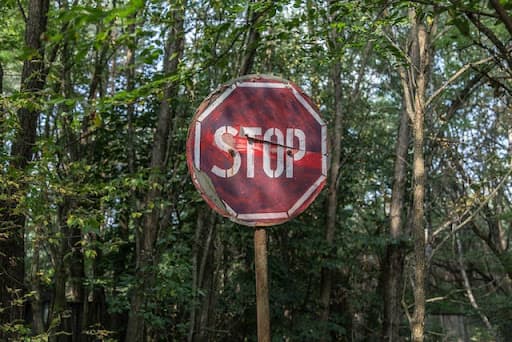
- Never give canned pumpkin pie filling or sweetened pumpkin puree to pets. It’s not only full of sugar but may contain nutmeg, which can be toxic to pets
- Even worse are the artificially sweetened pumpkin purees. These are likely to contain an artificial sweetener, called Xylitol.
- Xylitol Is poisonous to pets!
So make sure your canned pumpkin puree is pumpkin, wholly pumpkin and nothing but the pumpkin! No cunningly concealed nasties or hidden horrors lurking behind the label.
